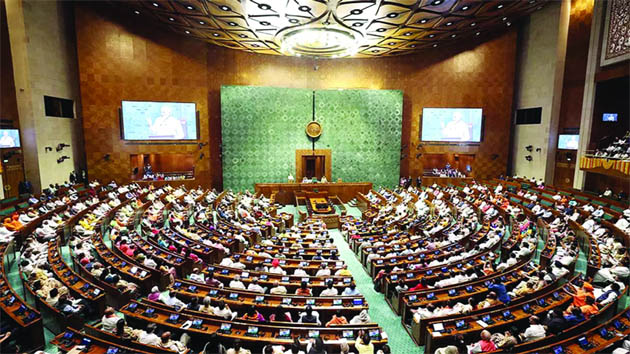Harihar Swarup
The first session of the 18th Lok Sabha has just concluded where an unprecedented level of acrimony was witnessed. Since this session was held immediately after the general elections, the mood during the electioneering, it appears, was carried into the house as was reflected in the speeches made from both sides. Few speakers referred to the issues, included or not included in President’s address. Fuel was added to the fire by the tone and tenor of the speech made by leader of the opposition in the Lok Sabha.
In Lok Sabha, Rahul Gandhi’s speech set the tone of further discussion in both the houses, particularly that of the replies to be given by the Prime Minister. The opposition members continuously shouted slogans in the Lok Sabha obstructing the Prime minister’s speech and they walked out of Rajya Sabha when he spoke there next day. Booing the Prime Minister during speech was worrying. So was the walk out by the opposition parties without listening to the Prime Minister. Both these acts by the Opposition are undeniably does not conform to basic canons of parliamentary democracy.
In Parliament, the right to speak should be balanced with respect for opposing view points and parliamentary decorum. Disagreements can and should be expressed through debate and discussion rather than through disruptive tactics that prevent others from exercising their right to speak. In a deliberate context, the right to be heard and duty to listen, are inseparable; in a deliberative context,; they are two sides of a democratic coin.
Expressing of dissent , no doubt, is in built in the working of any parliament, provided it is within the ambit of rules and practices of any house. Any gross violation is punishable. Any gross attempt to shout down a member of Parliament while speaking,.. And attempt, leave alone the Prime Minister who is also leader of house, is unacceptable and needs to be discouraged. More so, when Prime Minister gave full respect to the Leader of Opposition and sat and listened to his entire speech in Lok Sabha with calm and poise. In the same spirit, the opposition in the Rajya Sabha also should have sat and listened to what the PM had to say. Failing to do that amounted to the opposition shirking its responsibility.
The office of the Leader of the opposition has been associated with the highest traditions in India. Occupants of the office are expected to have procedure, conventions etc. They must not be seen to be instigating others to go to the well of the house and disrupt proceedings. They should avoid making defamatory or unsubstantial allegations that may be contradicted inside or outside the house. The Leader of the Opposition represents not only his party but also entire opposition in the house. So much so, in some countries he is seen as the shadow PM. Therefore, he has to be much more careful and responsible in what he says and how he behaves in the house. (IPA)


